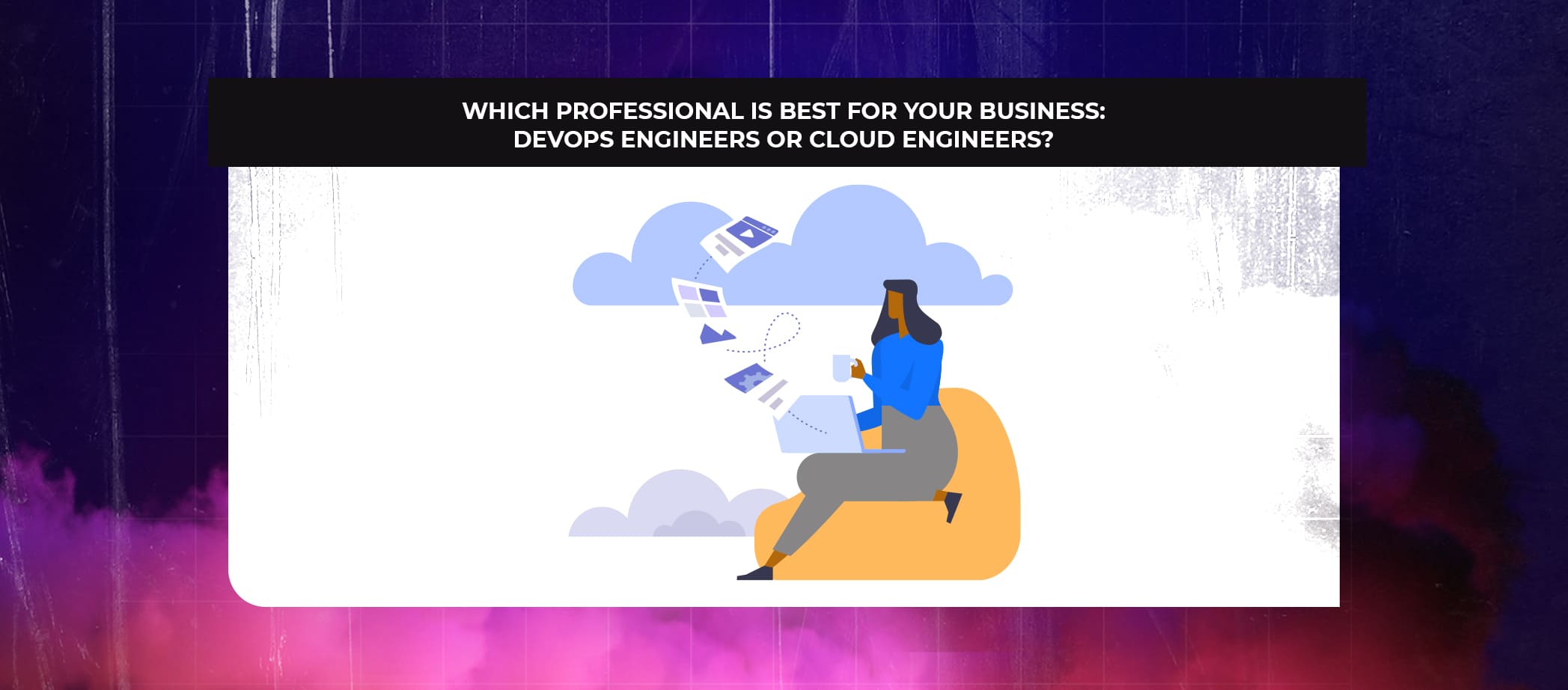
PeoplActive is an ISO 27001:2013 certified leading tech hiring platform. By utilizing an exclusive network of 4000+ Silicon Valley caliber tech talent specialized in 100+ in-demand IT skills, it was pretty easy for businesses to hire game-changing Engineers and developers in just 48 hours. So, if you want to accelerate your business, schedule a quick call with our experts now.
Given how quickly new technologies, tools, and professions are developing, the information technology sector is considered one of the most adaptive and swiftly expanding industries.
One profession that has grown significantly recently is DevOps Engineer. Allied Market Research projects that the global DevOps market will grow from its anticipated value of $6.78 billion in 2020 to $57.9 billion in 2030, with a CAGR of 24.2% between 2021 and 2030.
The business belief that Cloud Computing is the future and would offer limitless scalability without forcing them to invest in their infrastructure, on the other hand, has led to a strong demand for Cloud Engineers.
Do you need both of these positions for your team to succeed? Not Certain? You can get help from PeoplActive.
Table of Contents
Toggle
Table of Contents
ToggleWhat Impact Does a DevOps Engineer Have?
A specialist in the development and operations approach, which outlines the plan for expediting the procedures for system administration and software development, is known as a DevOps Engineer. For instance, the vast majority of large businesses have a development department with the responsibility of producing new products and an operations department with the duty of making sure everything functions as intended. The goal of a developer is to produce a product and put it to use as soon as possible. Because every modification entails a risk of failure and blunders, the operations department is interested in lowering the number of adjustments. Lack of synchronization causes the operations department’s workload and costs to grow.
The DevOps culture, embodied by the DevOps Engineer, a qualified individual with both development and real-world IT implementation experience, offers a resolution to this problem. DevOps Engineers work with managers, developers, and QA testers to enhance and automate the creation of software applications. The firm might save time and money by combining these teams and their areas of expertise to maintain a constant flow of information.
What Impact Does a Cloud Engineer have?
System management, development, and technical support are all intertwined in the work of a Cloud Engineer. These professionals make sure that Cloud Infrastructure and technology run continuously. They may be tasked with building a solution, moving a commercially available solution to the cloud, or maintaining software.
These professionals can regularly build scripts, implement software, and create disaster recovery strategies. The Engineer also contributes to the infrastructure’s development while monitoring and confirming the service’s functionality. Because the project development team is in control of the platform and users and frequently has proposals for fixes and service improvements, Engineers should pay close attention to them.
Differ From DevOps Engineer?
Let’s examine the technical responsibilities that Cloud Engineers and DevOps Engineers perform.
Job responsibilities of a Cloud Engineer
What kinds of duties do Cloud Engineers carry out? Take a look at this:
- Cloud system setup, administration, and technical support.
- On the system’s administrative side, deal with problems as soon as they arise and discover solutions.
- Customers should be made aware of the available services, their technological capabilities, and the specifics of how to use them.
- Develop and improve cloud-based software.
- Install local software on a Cloud platform.
- Cloud-based services are made available to streamline procedures and reduce expenses.
- Keep precise access records for Cloud services.
How to hire a remote Cloud Engineer
Job responsibilities of a DevOps Engineer
A few instances of the work a DevOps Engineer performs are as follows:- Software development can be completed more quickly when DevOps Engineering is used.
- As a result, progress is more secure.
- Bugs in newer versions are less likely to emerge.
- While automating the software development and release processes, coordinate operations.
- Development and scripting tools must be planned, designed, and produced.
- Automate
- Join in on the infrastructure and application development.
- Use monitoring strategies to control the product’s efficiency once it has been released.
Key Competencies that DevOps and Cloud Engineers must have
Let’s continue our comparison between Cloud Engineers and DevOps Engineers by going through the crucial skills required to bring the greatest value to your business.
Cloud Engineer
The main qualifications needed to become a Cloud engineer are as follows:
- The Cloud Security Engineer must have a strong technical foundation in cloud-based technologies.
- Tools for automation ought to be able to be used.
- Have a strong command of Linux;
- Clearly distinguish TCP from IP and TCP/IP;
- Know how to utilize HTTP(S) and DNS;
- Acknowledge Nginx, which is utilized by all online services;
- Possess expertise in video streaming technologies;
- It is necessary to have knowledge of configuration management systems like Salt, Ansible, Chef, and Puppet.
- Possess the necessary Python skills for data processing.
DevOps Engineer
The main competencies needed for a DevOps Engineer are as follows:
- Have a basic knowledge of operating system administration.
- A DevOps Engineer needs to be able to explain how complicated systems function in addition to having strong communication abilities.
- Knowledge of SQL and NoSQL, two database technologies.
- Possess expertise in and knowledge of tools like Git, Terraform, Kubernetes, Prometheus, Ansible, and Docker.
- Knowledge of Python, Golang, and Bash as programming languages.
- Stress reduction
- English with a technical accent.
- Presentation expertise
Which Professional Is Best for Your Business: DevOps Engineers or Cloud Engineers?
The capacity of DevOps services to fully automate the software development process is its main advantage. To be more precise, the planning, development, creation, assembly, testing, release, and delivery of the product to clients, as well as its continuous support and appropriate maintenance. DevOps philosophy can help to preserve continuity in a variety of critical tasks including collaborative business planning, deployment, release, planning, etc. by being installed promptly and expertly implemented. It can aid with the expansion of startups, and several have used the DevOps methodology from the outset.
As a result, the breadth of tasks performed by a Cloud Engineer is increasingly constrained to Cloud systems. They oversee platform administration, maintain fault tolerance, and help with infrastructure expansion. The role of the Cloud Engineer is to scale the service in time for the platform to operate flawlessly, for instance, if the entire country switched to a remote service and started watching more movies. This specialist may also create, enhance, and regularly integrate Cloud technology into the business. This specialist is crucial if your company uses this technology.
DevOps is therefore the ideal option if your company needs to be quick and flexible. Hiring a trained specialist is necessary if you want to fully benefit from Cloud Computing. Say goodbye to your competitors since you won’t be hearing any good news from them any time soon if you have both experts on your team and combine the advantages of the DevOps technique with Cloud Computing.

How can PeoplActive help you in hiring Qualified DevEngers?
So, according to you, who wins the battle: Cloud Engineer or a DevOps Developer?
Businesses today not only aim at income but also save overall costs. People that understand DevOps and work within the paradigms of seamless delivery and Docker containerization have the power to alter the nature of business. If implemented correctly, this strategy can drastically save expenses and create an incredibly productive process. Cloud Engineers then design, refine, integrate, and maintain these systems to function as intended. Utilizing the latter also drastically lowers infrastructure costs and eliminates scaling issues.
Feel like winning the war for talent?
Then you are at the right place.
PeoplActive’s DEV-ENGERS have left no stone unturned to build some remarkable teams that have helped businesses to achieve their goals.
Seek and ye shall find on-the-spot support!
If you have any questions about hiring a qualified DevEnger, feel free to contact us.
We are always happy to help you!




